Tornado3D v 1.0 feature list
Real time color preview
- Wireframe (standard wireframe);
- Solid (wireframe with hidden surface removal);
- Flat Shade (full color flat shade);
- Gouraud (as above but smooth objects are Gouraud shaded);
- Transparent (as above but transparent objects are shown with fixed
transparency);
- Texture (as above but brushmapped objects are textured with their first
map);
- Realistic NEW! (a less detailed interactive rendering mode,
amazingly faster!);
- Photorealistic. (interactive rendering: shows shadows, refractions,
reflections fog, all brushmap/textures of any kind, lens flares, Nurbs,
Metaballs, all the shaders and VOLUMETRIC LIGHTS!);
For the first time on the Amiga, What You See is What You Get in 3D!
The color realtime preview works with Ocs,Ecs,Aga and CyberGraphX compatible
graphic-cards in 16, 64, 256, 4096, 64K and 16M colors (16 and 64 colors
are black and white, 4096 and 256 colors are dithered). The preview is
always available (i.e. deforming an object shows its deformation realtime)
and its speed depends mainly on graphic card speed and window resolution
and less on processor speed. (For interactive rendering, which is a first
on any personal computer, processor speed does matter). NEW! Tornado3D
1.0 already has experimental support for Cybervision64/3D's hardware Virge3D
accelerator!
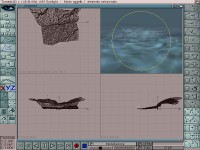
Integrated design
Modeling, animation and rendering are all done inside one editor, capable
of opening an unlimited number of projects at once. It is also possible
to cut/copy/paste data between projects.
Real-time operation
every transformation is performed in realtime on the full object (no
bounding boxes unless requested). NEW! The powerful "Arcball"
rotiational controller is now available for interactive camera rotation!
You'll never ever want to use any other method for rotating 3D objects
with a 2D mouse after trying Arcball! Objects can be Moved, Scaled, Rotated,
Sheared, Tapered, Twisted, Bent, Moulded, Pinched. Deformations can be
linear or spline based.
Force fields
can be used both as modeling or animation effects, and allow the user
to deform, attract, repel or move objects. For example it is possible to
drop a ball (and its force-field) inside a tube. The tube will automatically
enlarge/shrink to let the ball traverse it.
Automatic morphing and Shape/material Library
point editing an object during an animation creates the needed geometric
morphing informations. Also, changing material or light or world properties,
creates the appropriate morphing data. Those modifications are stored in
a library that can be easily modified by the user.
NEW! Inverse Kinematics
Chained inverse kinematics is fast and predictable, and is really identical
to the IK implementation of a well-known software for graphics workstations.
VCR-style animation
to create an animation, a vcr-style interface with JOG/Shuttle controls
allows the user to position / transform objects in keyframes. Pressing
REC generates keyframes and motion paths. A timeline panel allows more
precise modifications. Standard interpolating spline with Bias Tension
and Gain are provided. Standard SMPTE timecode with programmable frame-rate
is provided for easy integration in a video studio.
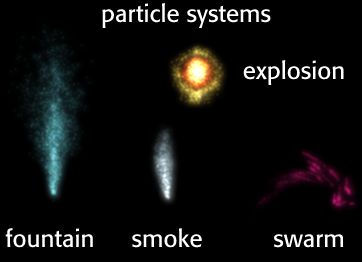
Particles and particle systems
direct rendering of single-point particles; the particles can be created
from the points of a polygonal object or as particle systems controlled
by forces such as gravity, wind, turbulence. Easy to use, flexible interface,
with no math knowlegde requirements. Special particle rendering methods
avoid the old spray-of-dots look producing highly realistic results.
Metaballs
metaballs and implicit surfaces are provided as primitives. Thay are
calculated in realtime with user-selectable level of detail. There is no
need for polygonization (but it is allowed). Opaque metaballs have no memory
cost during rendering. Metaballs can be additive and subtractive.

Booleans (NEW!)
Boolean cutting tool, plus the Add, Subtract and Intersect operators
allow you to easily cut and slice your objects
TRUE Nurbs
just like metaballs, Nurbs are calculated with an user selectable level
of detail and there is no need for polygonization.
SuperQuadrics
in addition to the usual polygonal primitives (planes, spheres, cones,
tubes, cubes, torii) SuperQuadric primitives allow to add easily rounded
objects (rounded cubes, beveled tubes, inflated cones...) acting only on
two sliders with realtime preview.
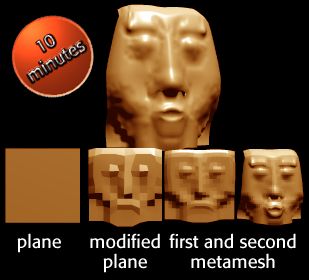
Metamesh (NEW!)
Powerful modeling tool that makes creating organic shapes a snap! Transform
rough sketches into detailed smooth models in seconds! Build complex straight
shapes with the the bevel tool and turn them into high definition curved
surfaces!
Fog
five kinds of fog are provided, both linear and non-linear. Fog can
be animated with auto-morphing. NEW! Fog can be made Turbulent and
animated along the scene to create an even more realistic environment.
Plus, fog can interact with Volumetric Lights to create all those stylish
beams of light we have seen countless times in hot Hollywood productions!
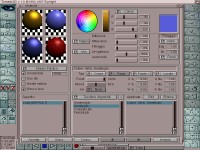
User interface
Font-adaptive gadtools gui, localized, with fullcolor customizable
gadget images.
Material Editor
an all-in-one material editor allows the user to try four different
materials at once. The preview spheres are calculated in realtime and full
color.

Shaders
different shaders allow the user to choose different algorithms for
top photorealistic quality (plastic, metal, water/glass, opaque...). NEW!
Amazing interpolated shading goes many steps beyond the usual Flat/Phong
setting most softwares limit you to. With Interpolated shading you can
define exactly how much smoothing you want and even inflate or hammer your
objects with no loss of rendering speed!
Brushmaps
planar, spherical, cubic and cylindric mappings. Maps can modulate
"Color", "Diffuse", "Reflect", "Environment",
"Ambient", "Bright", "Bump", "Specular",
"Polish", "Filter", "Refract" and "Clip"
properties. An unlimited number of maps can be applied to each surface.
Transparency
linear transparency or with inner/outer fading. Colors can be added
(light beams) or mixed (underwater scenes). High speed Refraction without
the need for ray-tracing.
Reflections
objects can reflect gradients, brushmaps or the actual scene with "cubic
environment maps". This high speed approach avoids ray-tracing and
also allows an easy integration of rendered objects into real-world scenes.
Rendering
high speed rendering thanks to a custom algorithm derived from the
"deferred shading accumulation buffer" method previously available
only on workstations. Several quality levels, related to the output media
(video/film), provide the user the same kind of output usually seen in
tv adverts and movies. High quality, fast, antialiasing.
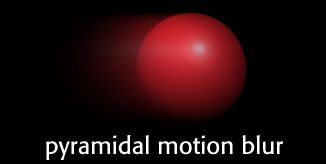
Pyramidal Motion-blur
true, high-speed motion-blur mimics closely the actual output of a
real camera. Compare the picture with the output of most renderers. Tornado3D
uses a proprietary algorithm in order to properly simulate the way light
strikes film (this happens in a logarithmic way, not linear as most renderers
do). The result is an amazing quality motion blur, that looks like the
real thing. And it is so fast that rendering times will be blurred as well!
:-)
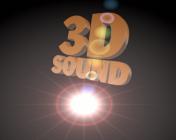
Lens flares
high quality lens flares with lens reflections, glow, streaks, star
filter, etc...
Shadows
realistic shadows without ray-tracing, soft shadows.
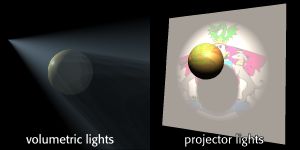
Lights NEW!
VOLUMETRIC LIGHTS! For the first time on the Amiga your lights will
have shape, shine thru fog and produce those so cool shadows streaks
that really make an image look REAL. Plus Distant, point, spot and the
unique "Umbrella" that allow the simulation of a professional
photo studio. Specular and diffuse components can be turned on and off
for each light. Several light diminishing properties allows the simulation
of different real-world lights. Also NEW are the image-projecting
ability of spotlights and Umbrellas that open up a whole new realm of special
effects including fake shadows.
Plug-in
an open plug-in interface allows procedural textures, effects, even
new primitives.
68040 & 68060 optimization
a custom math library has been written from scratch to make full use
of 68040 and 68060 cpus. Emulated intructions are never executed.
CyberGraphX Double buffering
high speed double buffering on CGFX compatible graphic cards even in
16/24 bit without memory cost. CyberVision 64 optimized.
Plus!
There are so many features in Tornado3D 1.0 that we might as well have
called it Tornado3D V 10.0! Point and face editing, spline modelling, automatic
spline polygonization for Lathe, all the standard Extrude, Extrude by Path,
Replication and Duplication tools. Plus Fractal subdivision of meshes,
Bevel tools to quickly build complex objects from simple shapes, object
tracking, object groups...
Minimum requirements
Amiga or 100% compatible, Os 3.0 o higher, 68020 or better with FPU,
8 megabyte of ram, 8 megabyte of free disk space, CD-Rom player.
WARNING! All the informations in this document are subject to change
without notice.
Questions, problems? Please, send us an email!
.......Page & graphics design by Eyelight.








